
Skill or Luck: How Generation Z Rewrites the Rules of the Game in Gambling
Hunting for good old gambling addicts is no longer in trend. Today, every iGaming project dreams of getting an audience from TikTok, directing all its experiments at young people (let's assume that they are already 18). But there is a problem: zoomers do not fall for "one-armed bandits", considering them an outright scam. Instead, they go headlong into the complete opposite of slots — skill-based games. on the phone (this is critical for 80% of Gen Z) and for the player to control the process himself. Let's figure out why the presence of "skill" has become the main factor.
So what are the skill games?
It's simple: these are games where your brain and reaction are more important than blind luck. This includes classics like poker and blackjack, where without an understanding of combinations and strategy, you are just meat. But there are also newer formats: craps (the same dice), Slingo (a mix of slots and bingo) and even slots with bonus rounds, where you control the process yourself and influence the outcome. In short, everything where you need not just to press the button until you are stupid, but at least minimally turn on your head. Fantasy tournaments are also often thrown into this pile, but this is a separate story — this is how projects try to attract a betting audience (and a crookedly made fantasy will not help them with this). And there are also entire ecosystems (Skillz, WorldWinner, Indian Zupee), where real millions of dollars are played out daily in hundreds of skill games.
What about money and the market?
The market is predicted to boost multiple times (from $18.21 billion in 2024 to $66.11 billion by 2033). The audience, as expected, is very young: in the States, 36% of all players are people from 18 to 34 years old, and this is the largest age category in the industry. Even the money of skill games brings in a different way: 28% are advertising, and 45% are entry fees. That is, you pay a buy-in and go to compete with real people. And you are already on the hook of the competitive spirit. There is a sporting interest to return and recoup, and not the feeling that you were just robbed by a machine gun (the money will not return from there...).
And what about providers?
Providers see everything. The element of competition is even pushed into crash games (leaderboards, chats, bets of other players), but excitement still reigns there. BetConstruct is trying to hook fresh blood by adding Chinese poker and backgammon to its portfolio. Uplatform makes a knight's move and integrates 150+ skill games into its aggregator, giving operators a huge sandbox for testing. Well, giants like Skillz just boast about the numbers: up to 4 million participation in tournaments every day and more than $60 million in prize money per month. The foundation of all this is the craving of Generation Z for competition.
But there are also problems
However, keeping the attention of Gen Z is a task with an asterisk. It is not enough just to attract them, they need to be constantly surprised. The statistics from Adjust are harsh: gambling apps lose up to 94% of players by the end of the first month. Retention on day 28, according to Embrace, is a measly 6.5% — almost no one stays for long. On top of that, there is a wild amount of fraud. Incognia lists popular schemes: armies of multi-accounts for abusing bonuses, "fixing" in tournaments, and smart bots that simply "farm" live players. This kills trust, makes honest users leave, and inflates the costs of anti-fraud systems. Making an honest matchmaking is much more difficult than opening access to a thousand slots.
Total?
Let's put it this way: skill games are a mirror of a generation. Maybe not 100%, but they definitely meet the needs of a young audience much better than the classics. It's like in a real casino: pensioners sit at the machines, and young people who want to think are at the poker table. Skill games do not have a trail of "pumping money", like slot machines. It remains only to understand how long this trend will last and who will be able to make money on it.



celese Haha, classic! First they screwed over the players, then the license turned out to be fake, and now they’re trying to undo everything. A total circus. Yeah, everything will just get bought. They’ll pay whoever they need in Curaçao and get a new license. Money rules everything, especially in this industry.




Mangarin4ik The section about how casinos fire VPNs is a gun. I've never thought about WebRTC and the time zone. Author, thank you, you may have just saved my next deposit.



































Slots are really for old-timers who still believe a machine “heats up” and is about to pay out. At least in poker something actually depends on your skill.